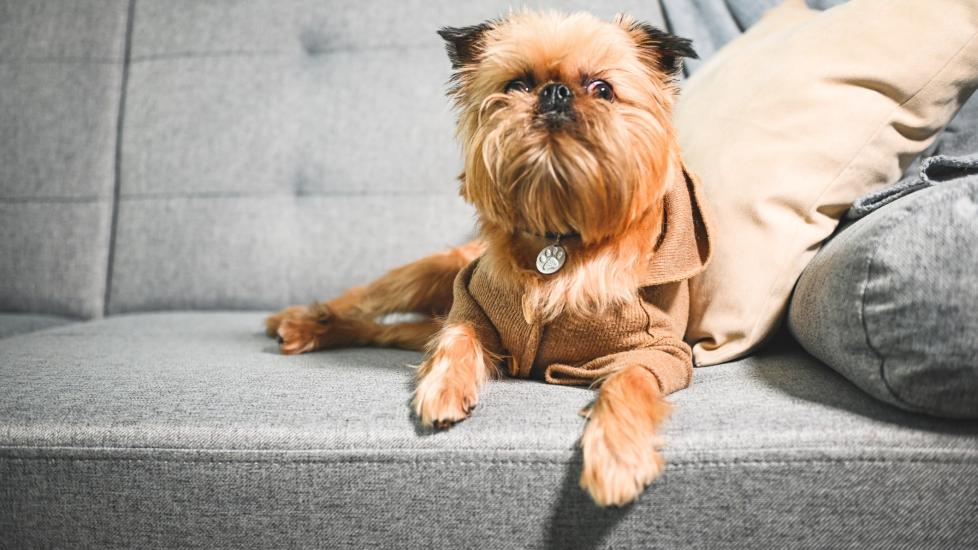Brussels Griffon
elenaleonova/iStock / Getty Images Plus via Getty Images
With a near-human expression, Brussels Griffons are adorable, intelligent, and social dogs that quickly win over fans with their larger-than-life personalities.
They are also small dogs, weighing in at 6–14 pounds and 7–10 inches tall. This, coupled with their friendly temperament, makes them perfect apartment dogs.
Brussels Griffons are known for their expressive, almost childlike faces and large, wide-set prominent eyes. Their stocky bodies and characteristic, purposeful trot are reflections of their heritage as vermin hunters in Belgium.
Because of their unique physical characteristics, the Brussels Griffon dog breed is often compared to the Ewoks from “Return of the Jedi.”
Caring for a Brussels Griffon
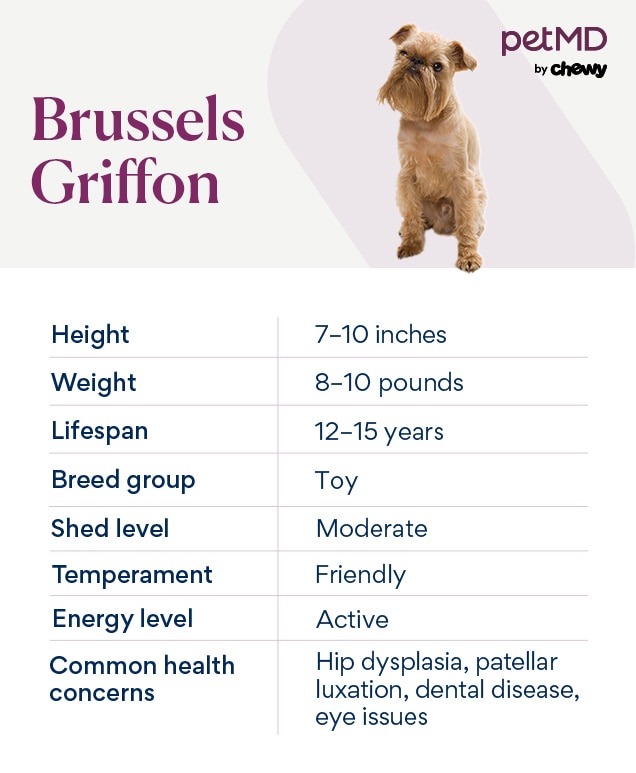
Brussels Griffons belong to a class of dogs called brachycephalic dogs, which means they have a short snout and flat-faced appearance. This makes them more prone to snore and more sensitive to hot, humid weather. Because of this, Brussels Griffons should not be left outside for extended periods of time.
Conversely, given their small size, they do not tolerate extreme cold, either. Brussels do best as house dogs.
They also love companionship and are known as “Velcro” dogs to their adoring humans. So, if you are planning on adding a Brussels Griffon puppy to your family, be prepared for a dog who wants to spend all their time with you.
Brussels Griffon Health Issues
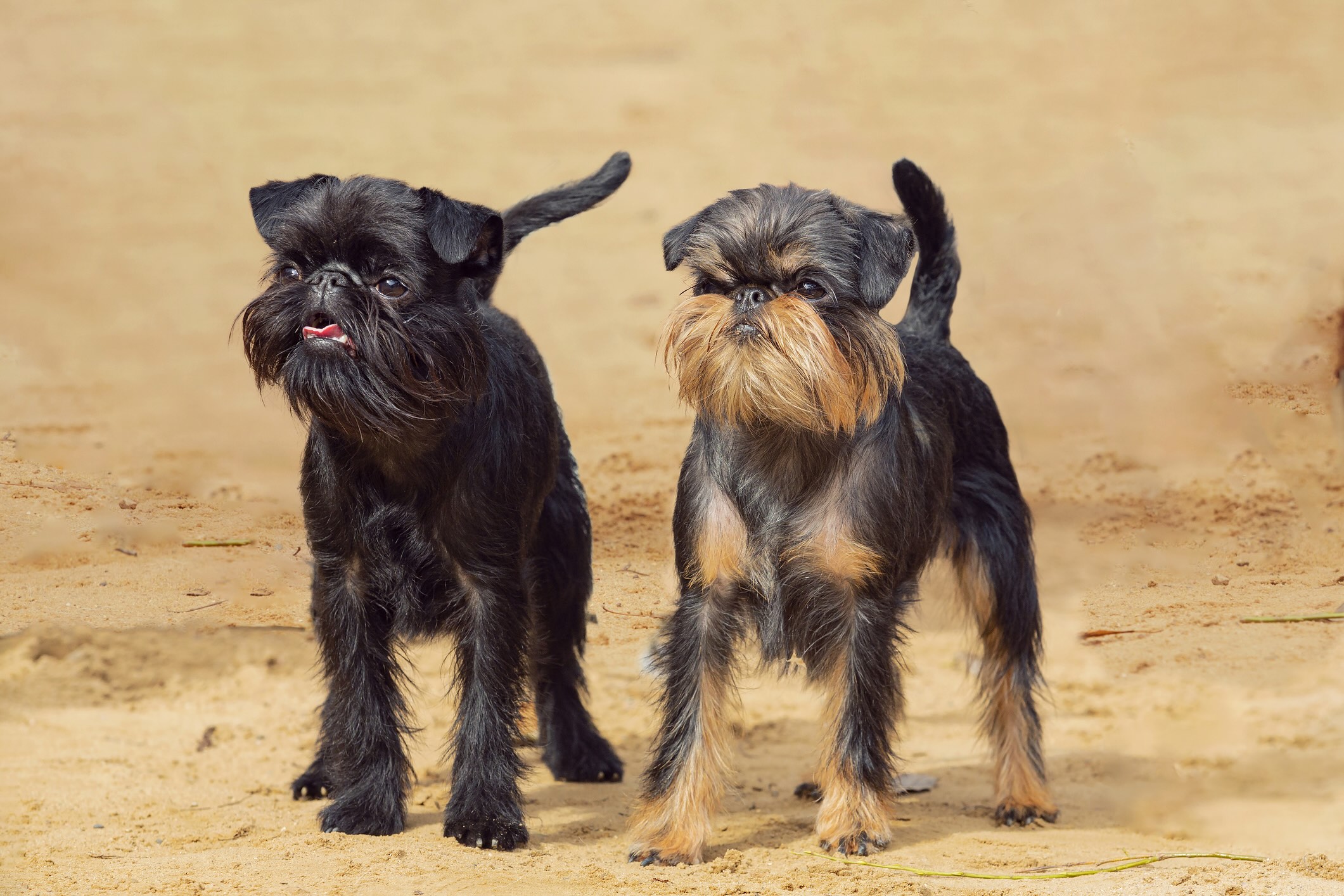
The average Brussels Griffon lifespan is 12–15 years and they are a generally healthy breed with few health concerns. But, like all dogs, they might develop a few health conditions.
Hip Dysplasia
Hip dysplasia is an instability or loose fit of the hip joint, which occurs in growing dogs because the hip socket does not fully cover the ball portion of the femur (thigh bone). This results in pain and arthritis in dogs.
Clinical signs of hip dysplasia are more prominent in large breed dogs. Luckily, thanks to their small stature, Brussels Griffons typically have minimal signs of pain or discomfort.
Hip dysplasia in Brussels Griffons can usually be managed with a joint supplement or medication. Rarely, they may need surgical intervention.
Patella Luxation
Patella luxation is a condition where the kneecap slips in and out of place. This can result in knee arthritis and pain.
Often, joint supplements and anti-inflammatory medications are sufficient treatment for these small dogs. However, if the luxation is severe, surgery may be recommended to correct the issue and keep the kneecap in place.
Eye Issues
Brussels Griffons can be predisposed to cataracts, progressive retinal atrophy (PRA), and eye injuries.
-
Cataracts, or cloudiness of the lens of the eye, can be corrected surgically by a veterinary ophthalmologist if it occurs.
-
PRA is an inherited form of degenerative ocular disease with no treatment or cure. It progresses to blindness in dogs but isn’t painful.
-
Due to their prominent eyes, Brussels Griffons are prone to eye injuries such as scratches or irritation. If your dog’s eyes are red or they are rubbing at them, check in with your veterinarian.
Dental Disease
Adult dogs generally have 42 teeth. But Brussels Griffons, with their “smoosh-faced” anatomy, have less space to fit these 42 teeth, causing the teeth to be crowded and grow at odd angles
This increases tartar and causes food or debris to become trapped easily, which can lead to dental disease.
Therefore, canine dental care is very important and Brussels Griffons will likely benefit from daily at-home tooth brushing as well as routine dental cleanings done by your veterinarian.
Other aspects of dental care, like vet-recommended dental chews and water additives, also help prevent dental disease.
What To Feed a Brussels Griffon
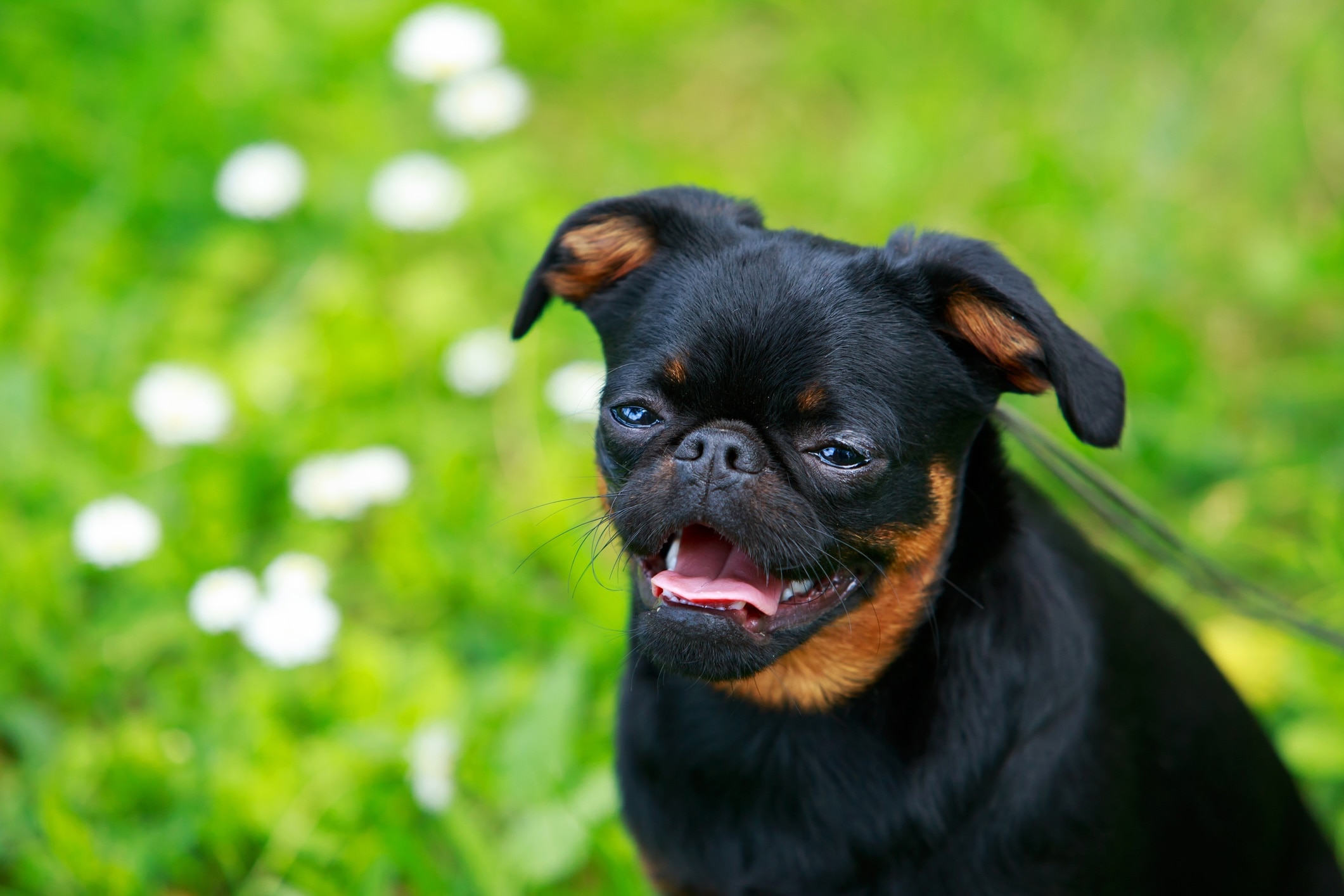
There are lots of diets on the market, and finding the right food for your Brussels Griffon can be overwhelming. An Association of American Feed Control Officials (AAFCO)-compliant food is a good place to start to ensure that the food you select meets standard nutritional requirements for pet foods.
Other considerations for the Brussels Griffon include small-bite or small-breed diets (due to their size), and possibly a vet-approved dental diet given their propensity for dental issues.
Talk with your veterinarian regarding your pet’s specific needs when selecting the best dog food for your Brussels Griffon.
How To Feed a Brussels Griffon
As small dogs, Brussels Griffons appreciate a few feedings throughout the day—typically two or three meals total. They can be slightly picky or finicky eaters, so choosing a highly palatable diet or even using food toppers may be useful.
Always select a diet that’s appropriate for your pet’s life stage (puppy, adult, or senior).
How Much Should You Feed a Brussels Griffon
When determining how much to feed your dog, it’s important to read the instructions on the bag or can. The caloric content of each food can vary significantly, and therefore the food bag or can (along with your vet’s advice) is the best place to make that determination.
Maintaining a healthy weight and monitoring your pet’s caloric intake are keys to a healthy lifestyle. So be sure to discuss your Brussels Griffon’s ideal weight with your veterinarian and adjust the amount you are feeding based on ideal weight, not current weight.
Also, don’t forget that dog treats count as calories too. While they are great for training, giving too many can lead to overweight pups. Treats should never make up more than 10% of a dog’s daily calories.
Nutritional Tips for Brussels Griffon
Always discuss any supplements or diet aids with your veterinarian before starting them to ensure they are right for your pet.
Brussels Griffons may benefit from omega-3 fatty acid supplements to keep their gorgeous coats healthy and shiny. They may also benefit from joint supplements with omega-3s, glucosamine, and chondroitin to maintain healthy cartilage.
Behavior and Training Tips for Brussels Griffon
Brussels Griffon Personality and Temperament
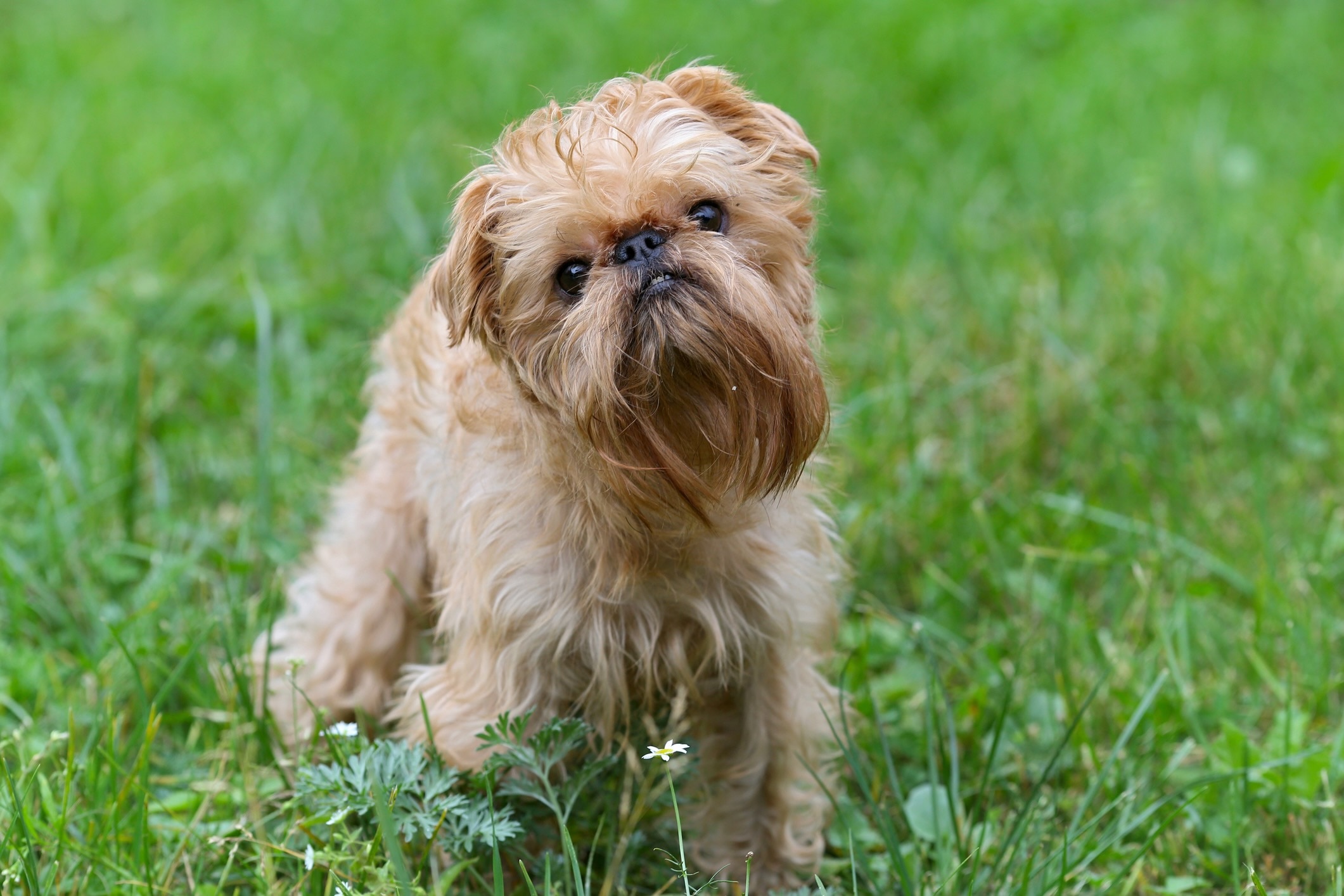
Brussels Griffons are big personalities in small packages. Known for their childlike expressions and intelligence, this breed will keep you entertained.
These dogs are best suited for pet parents who prioritize companionship and are prepared to spend a lot of time with their dog. They are considered “Velcro dogs” and don’t like to be left alone for extended periods of time. They will flourish in settings where they can be a central part of the family.
Brussels Griffons have a medium energy level and will do fine with up to 30 minutes of moderate activity or neighborhood walks per day. They are happy to get up and go, or to take more of a lounging role—as long as they are with their loving pet parent, they’re happy.
Brussels Griffon Behavior
Brussels Griffons typically do well in families with children, other dogs, or cats, but they can be sensitive, so supervision is recommended.
Similarly, Brussels Griffon dogs can be nervous around strangers or in new situations. However, early and consistent socialization can help them feel more confident and comfortable.
In general, they are fun-loving, happy dogs. But expect them to bark when someone knocks at the door.
Brussels Griffon Training
Brussels Griffons are smart and have a strong bond with their pet parents, making them easy to train with positive reinforcement. They will benefit from socialization and puppy training classes to help ensure a well-rounded, confident dog with good manners.
Most Brussels Griffons also enjoy tricks training, and some will do very well in agility classes.
As with many toy breeds, Brussels Griffons can take some extra time with potty training and patience is the key. Due to their sensitive nature, Brussels Griffons do not respond well to harsh correction and require more of a gentle approach.
They will also often develop undesirable behaviors if left alone for long periods of time, as they strongly prefer to be with their family.
Fun Activities for Brussels Griffon
-
Learning tricks
-
Agility
-
Up to 30-minute daily walks
-
Cuddling
Brussels Griffon Grooming Guide
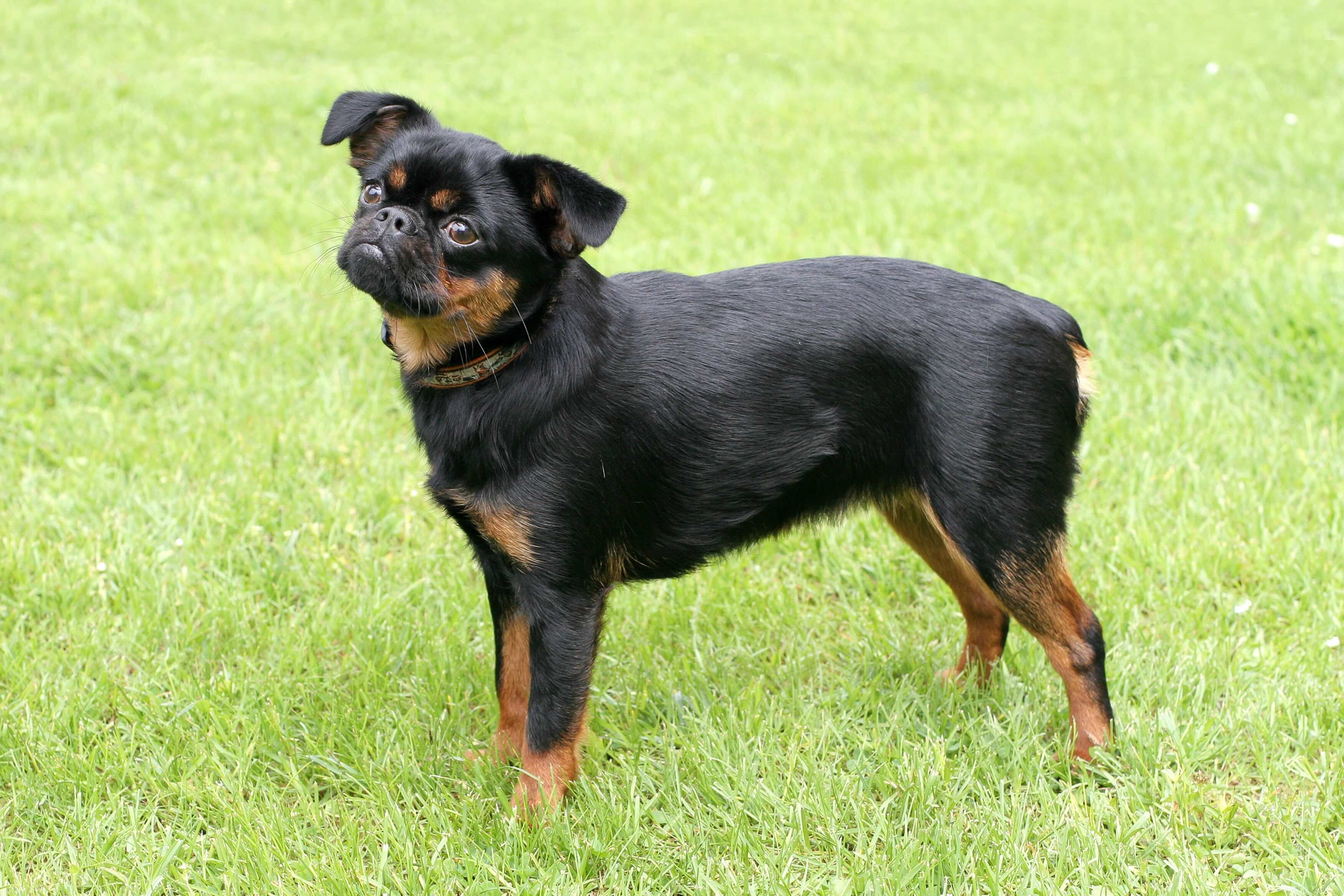
Brussels Griffons come in four colors: red, beige (black and reddish brown with black face), black and tan, and black.
There are also two types of Brussels Griffon coats—smooth and rough. The length of their coat will affect the level of grooming needs you can expect.
Skin Care
As brachycephalic dogs, Brussels Griffons have a nose fold that needs to be kept clean and dry. Their face folds should be cleaned around once a week.
You can use a warm, wet wash cloth to wipe the area or a dog-safe face wipe, like Vetnique Labs Grooming Wipes. Be sure to dry it off afterward to prevent accumulation of bacteria or yeast.
Coat Care
The smooth-coated Brussels Griffons have a straight, short, glossy coat that requires occasional baths and daily to weekly brushing. You can expect short-haired Brussels Griffons to shed a moderate amount.
The rough-coated Brussels Griffons have a wiry, dense coat and characteristic beard. Rough-coated Brussels Griffons will have moderate grooming demands, requiring professional grooming every four to eight weeks in addition to occasional baths and weekly brushing.
The rough-coated Brussels Griffons do not shed, unlike their smooth-coated counterparts.
Eye Care
Brussels Griffons have large, prominent eyes that are prone to injury. If your dog’s eyes have discharge, are red, or if your dog is rubbing at them, talk with your veterinarian.
Ear Care
Perform regular ear cleanings, especially after bath time to make sure the ears remain dry. If you notice debris in the ear, redness, or odor, please contact your veterinarian. These could be signs of an ear infection.
Dental Care
Always brush your dog’s teeth with dog-safe toothpaste (never human toothpaste, which can be toxic) and a toothbrush.
Nail Care
As with all breeds, you’ll need to trim your dog’s nails regularly to keep them neat and short. If you can hear your Brussels Griffon’s nails clicking on the floor, it’s time for a trim.
Considerations for Pet Parents
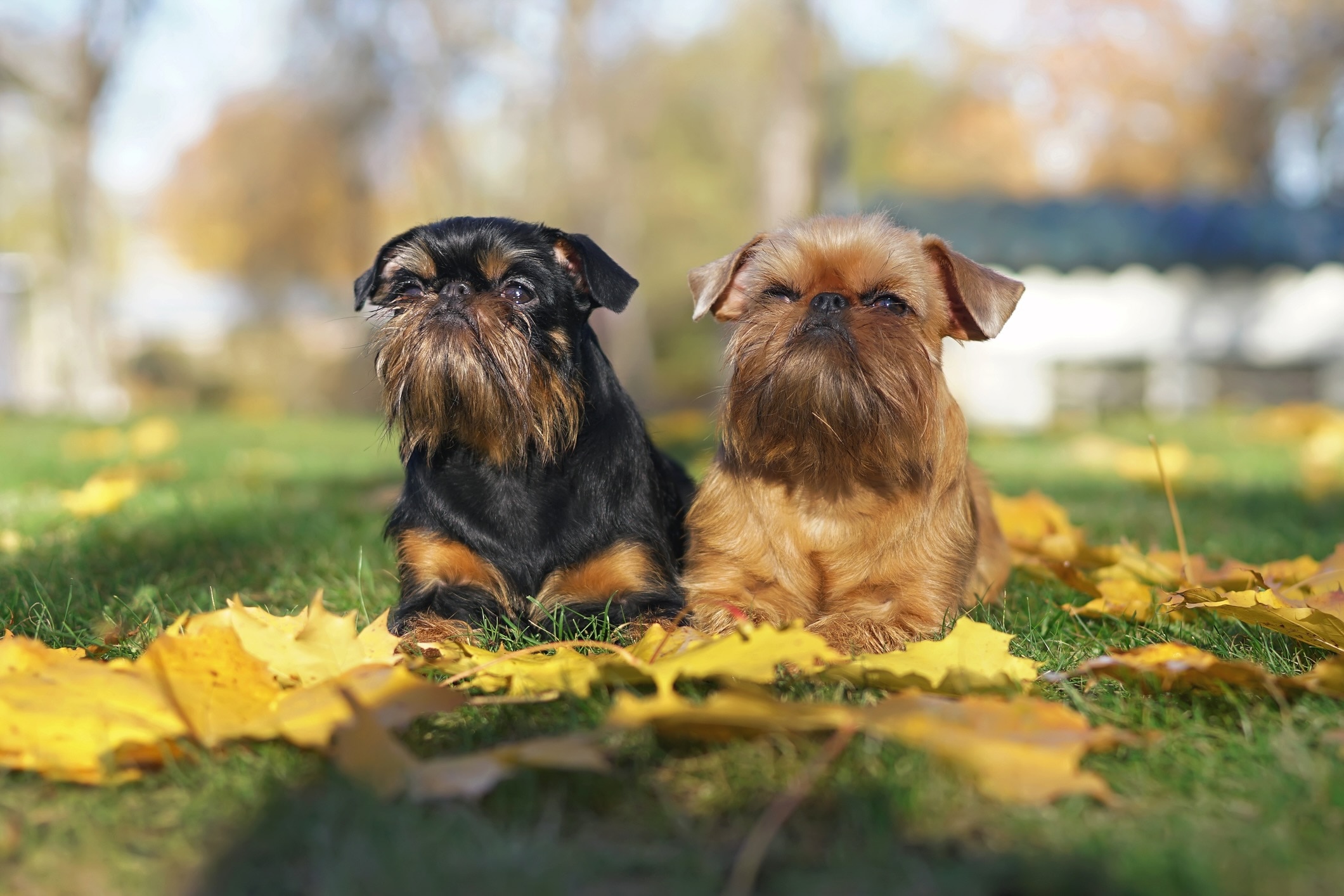
The Brussels Griffon can be classified as a clingy dog, so the breed is best for a pet parent who wants to spend a lot of time with a furry companion. They are also a bit tricky to potty train, so a family with experience (and a lot of patience) is recommended.
The most prominent health concern for pet parents to be aware of when considering a Brussels Griffon is their brachycephalic face. Their short snout makes it difficult for this dog to pant effectively, making them prone to overheating.
Care should be taken to limit exercise and extended periods of time outside during the summer months and during poor air quality days.
Brussels Griffon FAQs
Is a Brussels Griffon a good family dog?
Yes. Brussels Griffons typically do well in families with children, other dogs, or cats. That said, all interactions between kids and dogs should be supervised to make sure these little pups aren’t accidentally injured during playtime.
Are Brussels Griffons smart dogs?
Yes. Brussels Griffons are known for their high degree of intelligence and strong bond with their pet parents.
How much do Brussels Griffons cost?
While prices may vary depending on specific breeders and geographic location, one can expect to pay $1,500–$2,000 for a Brussels Griffon puppy. You can look for a dog at the National Brussels Griffon Rescue.
Are Brussels Griffons rare?
Yes. While they are slightly more common in Europe because they originated in Belgium, they are considered an uncommon breed in the U.S.
Are Brussel Griffons affectionate dogs?
Yes. They are nicknamed “Velcro” dogs due to their strong desire to be with their pet parents. Brussels Griffons thrive on companionship and do not do well when left alone for extended periods of time.
Do Brussels Griffons like to be cuddled?
Yes. Brussels Griffons will often even pick a favorite person to snuggle with.
